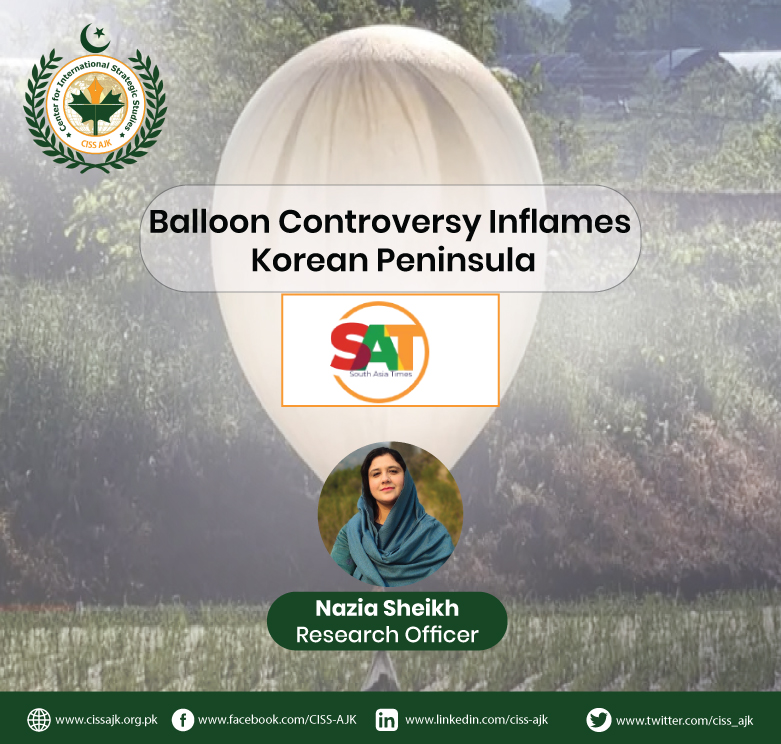Balloon controversy inflames the Korean Peninsula. On June 4th, 2024, South Korea announced that it had suspended a contentious military deal with North Korea to begin front-line military activity. On Tuesday, June 4th, the South Korean Cabinet Council and President Yoon Suk-Yeol endorsed a proposal to halt the 2018 inter-Korean agreement to reduce front-line military tensions.
The Bizarre Escalation Between Koreas
According to officials, the military agreement was suspended later on June 4. North Korea must be notified of the deal’s suspension following a relevant South Korean law. However, defense officials claimed that the suspension announcement would act as notice to North Korea because all lines of communication between the two Koreas are still closed.
Balloon Controversy: The Catalyst
The reason behind the suspension of the 2018 inter-Korean agreement was that North Korea flew approximately 980 balloons carrying trash, including used paper and cigarette butts, from across the Korean Demilitarized Zone (DMZ) on May 27–28 and June 1–2, 2024.
The balloons were reportedly packed with fertilizer or manure in a few cases. People were instructed not to touch the balloons and to contact the military or police if they came across one.
Again hundreds of trash-carrying balloons were launched over the border by North Korea on Monday 10 June, according to Seoul’s military. This came after Kim Jong Un’s powerful sister threatened to take more action if the South continued its psychological warfare. Midway through May 2024, activists in the South, including North Korean defectors, began sending dozens of messages northward with anti-Kim propaganda and flash drives filled with K-pop music. This was the beginning of the tit-for-tat balloon blitz.
The Psychological Ploy: Why Balloons Are More Than Just Trash?
The 2018 agreement, according to South Korean Prime Minister Han Duck-Soo, has reduced military readiness in the country at a time when the public is actually at risk from the North’s provocations. Han mentioned the balloon campaign by North Korea, the alleged blocking of GPS signals in the South, and nuclear weapons tests aimed at South Korea. The Koreas agreed to stop all hostile acts at border areas, including aerial drills, live firing exercises, and psychological warfare, as part of a military pact made during a brief period of reconciliation.
South Korea’s Response Over Balloon Controversy
South Korea will take all necessary precautions to shield the population from North Korean provocations, according to Cho Chang-rae, deputy minister of defense for policy. “North Korea is the only party to blame for this state of affairs. Our military will punish North Korea quickly, vehemently, and completely if it continues to provoke”, Cho stated, collaborating in tandem with the robust defense posture of South Korea and the United States.
Officials from South Korea indicated that the deal’s suspension in 2018 would let them conduct front-line military exercises, but they withheld further details from the public. Witnesses report that South Korea was thinking of resuming frontline propaganda loudspeaker broadcasts. This is a psychological campaign reminiscent of the Cold War that experts claim has hurt North Korea, a tightly controlled state whose 26 million citizens are largely denied access to outside news.
South Korea’s Live-Fire Drills
On Wednesday, June 26th, 2024, South Korea resumed live-fire drills near the maritime border with North Korea for the first time in seven years. The full-scale live-fire drills took place on the islands of Yeonpyeong and Baengnyeong in the Yellow Sea, just south of the Northern Limit Line (NLL) — the de facto inter-Korean maritime boundary, according to Seoul-based Yonhap News. During the exercises, South Korean soldiers fired 290 live rounds into the waters off the islands, utilizing K9 howitzers, Chunmoo multiple rocket launcher systems, and Spike anti-tank missiles. The last live-fire exercises by South Korean forces were held in 2017, ahead of the 2018 inter-Korean tension reduction agreement that barred both sides from such activities.
Balloon Controversy: Legal and Political Context
Legal justifications do not exist for South Korean authorities to forbid citizens from sending balloons bearing leaflets to the North. A controversial regulation that made flying balloons in opposition to Pyongyang illegal was overturned by the South Korean Constitutional Court in 2023. The legislation was deemed by the court to be an unduly restrictive measure of free speech.
It is evident that amid concerns surrounding North Korea’s November 2023 launch of a spy satellite, the two Koreas did various actions that violated the terms of the 2018 agreement, leaving it in limbo. Accusing Pyongyang of persistently breaking the deal, Seoul announced at the time that it was eliminating the clause establishing a no-fly zone close to the border. North Korea has already declared it will no longer follow the terms of the 2018 agreement. In response to Seoul’s move to completely halt the 2018 agreement, Pyongyang has not yet responded.
In general, it is believed that North Korea has increased its weapons testing and hardened its rhetoric in recent years to increase its influence in upcoming negotiations with the United States and South Korea. However, it might be claimed that the North’s most recent actions were specifically planned to cause conflict in South Korea due to the country’s government’s strict stance towards North Korea.
Opposition and Public Sentiment
Liberal politicians and activists in the opposition who support closer relations with North Korea expressed disapproval of the South Korean government’s decision to halt the 2018 agreement over the Balloon Controversy. However, given that the garbage-carrying balloons heightened anti-North Korea sentiment in the South, it’s unclear how powerful their voices are.
The public’s demands for a halt to anti-North Korean leafleting in South Korea may intensify in response to the North’s balloon activities, but it’s uncertain whether and how strongly the South Korean government can advise civil groups not to send balloons toward North Korea.
The views expressed in this article are the author’s own. They do not necessarily reflect the editorial policy of the South Asia Times.
Nazia Sheikh is a Research Officer at Centre for International Strategic Studies, AJK. She is an MPhil scholar in international relations from international Islamic university Islamabad.




